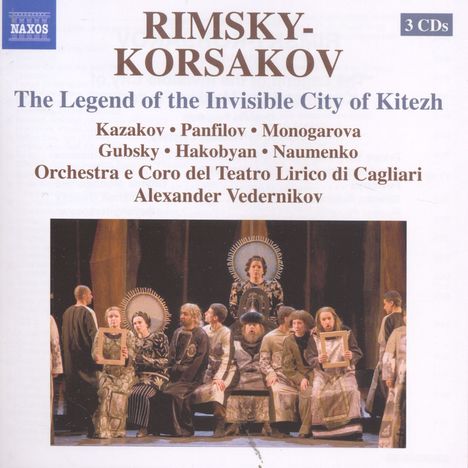Nikolai Rimsky-Korssakoff: Die Legende der unsichtbaren Stadt Kitesh auf 3 CDs
Die Legende der unsichtbaren Stadt Kitesh
Herkömmliche CD, die mit allen CD-Playern und Computerlaufwerken, aber auch mit den meisten SACD- oder Multiplayern abspielbar ist.
(soweit verfügbar beim Lieferanten)
- Künstler:
- Mikhail Kazakov, Vitaly Panfilov, Tatiana Monogarova, Mikhail Gubsky, Teatro Lirico Di Cagliari Orchestra, Alexander Vedernikov
- Label:
- Naxos
- Aufnahmejahr ca.:
- 2006
- Artikelnummer:
- 2278112
- UPC/EAN:
- 0730099028875
- Erscheinungstermin:
- 27.2.2012
- Serie:
- Naxos Opera
Diese 1905 vollendete Oper von Rimsky-Korsakow verbindet russische Folklore mit religiösen Mythen mit einer ordentlichen Dosis Patriotismus. Besonders der letzteren Zutat ist es wohl zu verdanken, dass Rimsky-Korsakows Werk nicht durch das Sowjetregime aus dem Verkehr gezogen wurde. Doch auch die Behandlung des Christentums als ein faszinierender folkloristischer Aspekt abseits der üblichen religiösen Pfade war ein wichtiger Punkt, um die Zensur fernzuhalten.
Im Gegensatz zu den meisten russischen Opern ist Kitesch durchkomponiert und zuweilen stark symphonisch. Infolgedessen können einzelne Vokalnummern nicht ohne weiteres extrahiert und als freistehende Stücke aufgeführt werden. Sänger und Orchestermusiker werden alle als Teil von Rimskij-Korsakows Tonmalerei behandelt. Ein meisterhaftes Beispiel ist das wiederholte Läuten von Glocken aus der verschwundenen Stadt. Diese Idee war dem Komponisten schon früh in den Sinn gekommen, denn im Sommer 1903 sagte er Belsky: "Die Oper wird mit einem Klaviertremolo F-Dur-Akkord auf den Glocken enden. Es wird notwendig sein, dies im Voraus mit den Glocken des Maryinsky-Theaters auszuprobieren". Die Rolle des Orchesters bei der Hervorhebung des Geschehens auf der Bühne ist so groß, dass es sogar als "die eigentliche Hauptfigur" der Oper bezeichnet wurde. Es ist interessant festzustellen, dass Rimskij-Korsakow im Sommer 1905, während er Kitesch den letzten Schliff gab, wieder an seinen Orchestrierungsprinzipien arbeitete, die er etwa dreißig Jahre zuvor begonnen hatte zu schreiben. Sowohl Strawinsky als auch Rachmaninow wurden auf ihre eigene, sehr unterschiedliche Weise von den in diesem Handbuch enthaltenen Ideen beeinflusst.
Product Information
This opera by Rimsky-Korsakov, completed in 1905, combines Russian folklore with religious myths with a good dose of patriotism. It is probably thanks to the latter ingredient in particular that Rimsky-Korsakov's work was not taken out of circulation by the Soviet regime. But the treatment of Christianity as a fascinating folkloric aspect off the beaten religious path was also an important point in keeping censorship away.
Unlike most Russian operas, Kitezh is through-composed and strongly symphonic at times. As a consequence, individual vocal numbers cannot be readily extracted and performed as free-standing pieces. Singers and orchestral musicians alike are all treated as part of Rimsky-Korsakov’s tone-painting. A masterly example occurs with the repeated tolling of bells from the vanished city. This idea was fixed in the composer’s mind from early on, for in the summer of 1903 he told Belsky that ‘the opera will end with a piano tremolo F major chord on the bells. It will be necessary to try this out in advance with the bells of the Maryinsky Theatre.’ Such is the orchestra’s rôle in highlighting the events on stage that it has even been described as ‘the real main character’ of the opera. It is interesting to note that while Rimsky-Korsakov was adding the finishing touches to Kitezh in the summer of 1905, he was again working on his Principles of Orchestration, which he had first started writing about thirty years earlier. In their own very different ways, both Stravinsky and Rachmaninov were influenced by the ideas contained in this manual.
Disk 1 von 3 (CD)
Die Sage von der unsichtbaren Stadt Kitesch (Oper in 6 Akten)
-
1 Vorspann: In praise of wilderness
-
2 Ah, you forest, my forest (1. Akt)
-
3 Where are you, my dear friends
-
4 I know all the forest paths
-
5 Day and night we have our service
-
6 Dearest, how can you live life without joy
-
7 Hail to thee, lips of honey
-
8 As soon as the marksman came
-
9 Show them, Mikhaylushka (2. Akt)
-
10 Ah, my foolish children!
-
11 Gracious benefactors
-
12 Do not sin, god allows a good word
-
13 Over the bridges of gelder-tree
-
14 There will be noch such beauty in the steppes
-
15 Stop, you godless heathens!
Disk 2 von 3 (CD)
-
1 Good fortune to you, citizens of Kitezh (3. Akt, 1. Szene)
-
2 God still preserves greater Kitezh
-
3 Oh glory, vain wealth!
-
4 Wondrous queen of heaven
-
5 Wondrous queen of heaven
-
6 God's will be done
-
7 What are we standing about for, sisters?
-
8 The battle near Kerzhenets
-
9 Here is the oak grove (3. Akt, 2. Szene)
-
10 Don't worry! We shan't touch you
-
11 It was not hungy ravens
-
12 Ah, my dear husband, my hope!
-
13 No, that accursed ringing
-
14 Ah, folks, at liberty
Disk 3 von 3 (CD)
-
1 Oh, I can't go (4. Akt, 1. Szene)
-
2 Well, let's go pray if you want
-
3 What's happening to me?
-
4 Let me see: what pretty flowers
-
5 Is that you, radiant light of my eyes?
-
6 The bridgegroom has come
-
7 He who partakes of our bread
-
8 The lord promised those who seek (4. Akt, 2. Szene)
-
9 Radiant kingdom!
-
10 I bow to you, righteous people
-
11 Ah, my faithful bride
Mehr von Nikolai Rimsky-...
-
Nikolai MiaskowskyCellokonzert op.66CDVorheriger Preis EUR 17,99, reduziert um 0%Aktueller Preis: EUR 7,99
-
Nikolai Rimsky-KorssakoffOrchesterwerkeCDAktueller Preis: EUR 19,99
-
Hideko Udagawa - Romantic NoveltiesCDAktueller Preis: EUR 19,99
-
Sophie Retaux, OrgelCDVorheriger Preis EUR 19,99, reduziert um 0%Aktueller Preis: EUR 5,99






